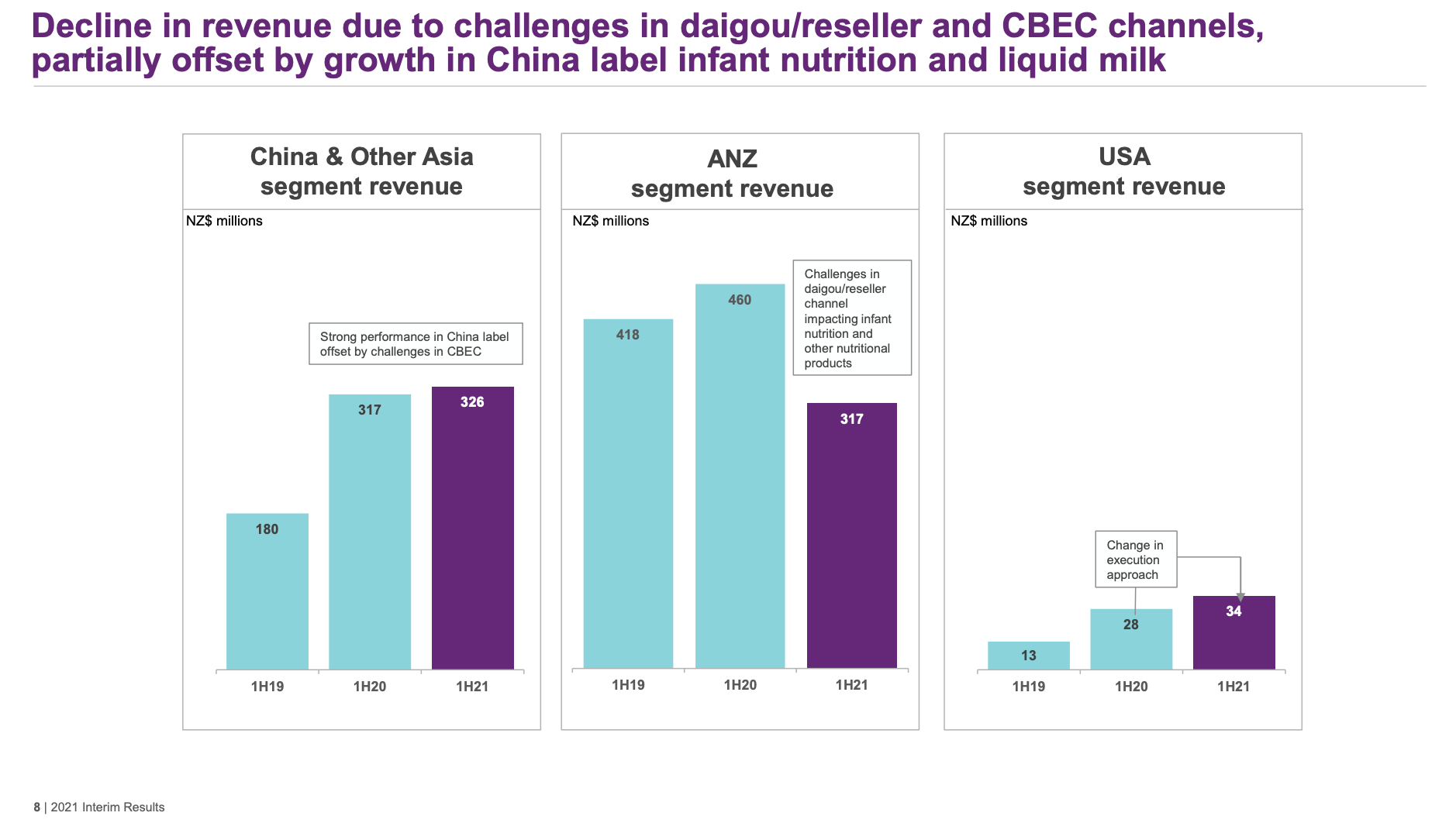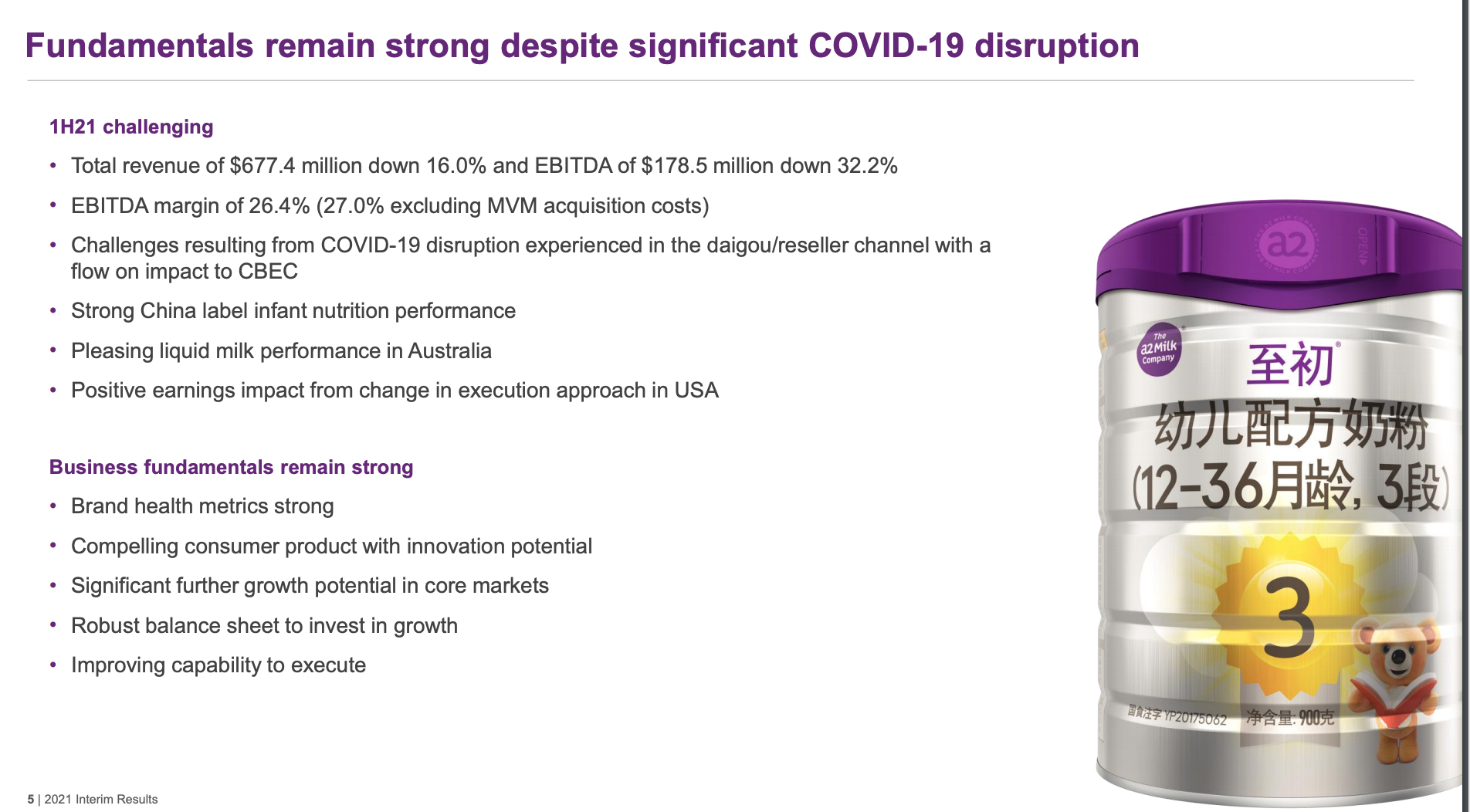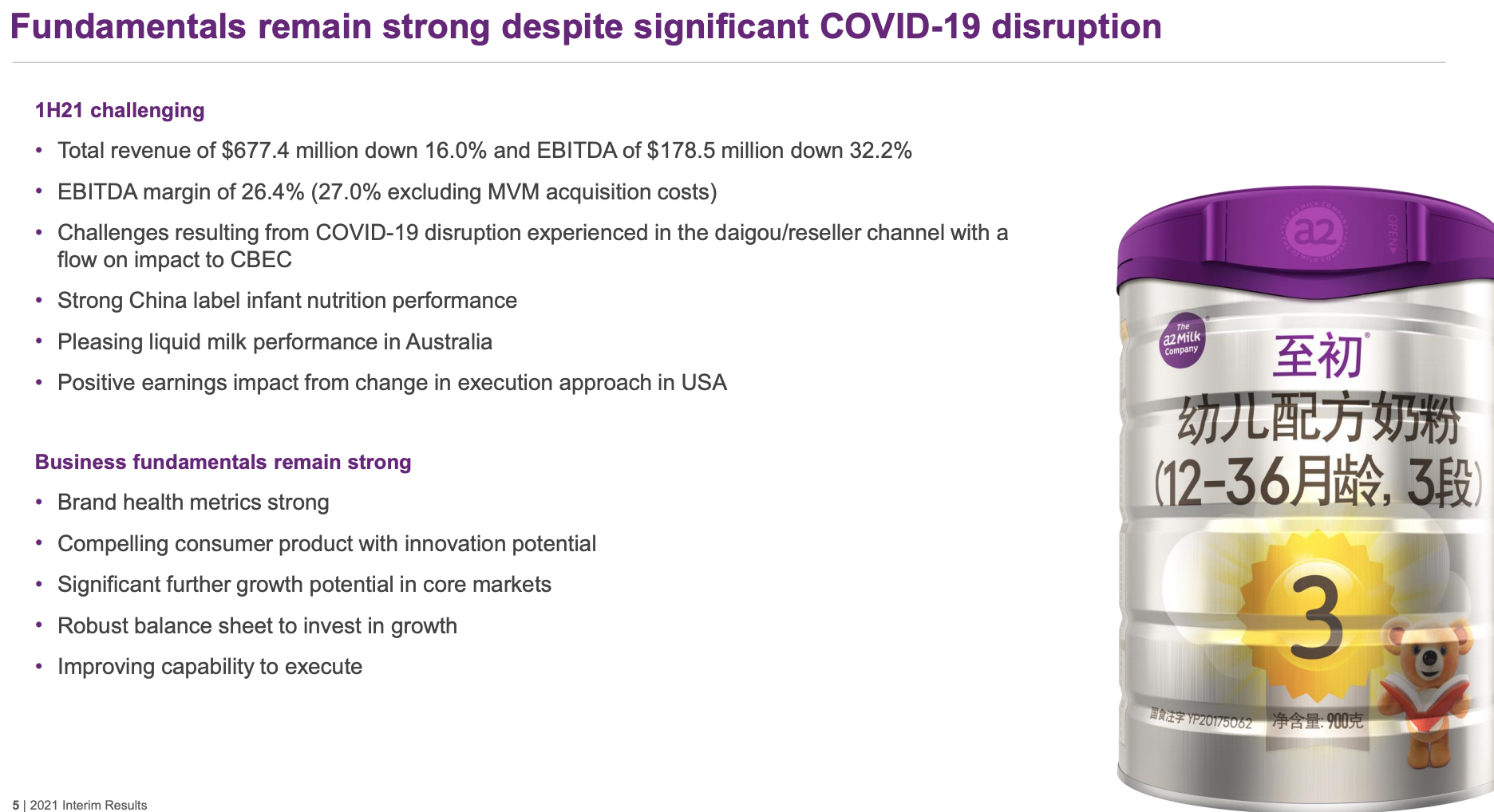A2's remarkable story desperate for a turnaround
A2 Milk's results commentary began with "Fundamentals remain strong despite significant COVID-19 disruption." Having been down 25% on the year and 38% since the start of 2020, this statement appears to sit firmly on the optimistic side.
Whilst this former ASX darling who specialises in distributing mysterious probiotic-laden milk products did reach a historic high in July 2020, it has been a steep descent since. Chinese regulation and restricted Daigou movement have led to many questions about the sustainability of their operations. Many of you must have thought this could be overcome though, with A2M being voted in as your 8th most tipped large-cap in our annual reader's survey. Accordingly, the question emerges: What can management do to turn fortunes around and fulfil the destiny imposed on the company by Livewire's experts?
In light of their report, I sat down with Chris Tynan from DNR Capital to explore A2M's results and consider what actions need to be taken in order to renew their fortunes.
What is appealing about A2 Milk and have you ever held it?
Looking at what makes it an attractive company, it has been a really remarkable story. It's been very cleverly managed from a microcap through to quite a large-cap story and they've structured it with low capital commitments. They've been able to generate incredible returns on invested capital and grown progressively to sequentially overtake a lot of other consumer companies in terms of market cap. Traditionally a lot of fund managers who missed the opportunity on the way up have tended to just throw rocks from the sidelines, but it's now a very challenging environment. You've got an absentee Daigou, well-funded domestic competitors and an inflexible regulator. But I think they've got probably one of the strongest brands in the region and a really unique differentiator. It is actually turning into more of a reopening play. If the stars are aligned for them, it could represent some compelling value in the future. It could also fit nicely into a larger FMCG portfolio, so M&A activity couldn’t be ruled out.
We have not held A2 in the past. It's always been on the radar, but there's been a valuation that is a bit difficult to overcome; concerns around product and geographic concentration and the regulatory risk has been too onerous for us.
Unpacking our concerns further, the Chinese government has shown a willingness to intervene in any number of markets, grain coal and more recently wine producers can attest. Chinese regulation is what it is and international brands always have to factor this into their strategies. Perhaps New Zealand at a government level has done a better job than Australia at keeping relations and this is helpful for A2 milk. The group has been quite adept and nimble in terms of responding to the regulatory changes that the Chinese regulators put through. To be honest, their greatest asset right now is probably not being Australian. The other thing is that regulators are quite keen to progress the interests of their domestic infant formula producers, which is understandable given the importance of the product to the mothers of China. Competitors like FeiHe have been investing pretty aggressively, and that they've managed to deliver innovative formulations and new product developments.
The international brands are effectively fighting with one hand tied behind their back because the pace of regulatory approvals slows product innovation and progress new product.
Looking at today's earnings report in a bit more depth, what were the notable points that emerged?
The key takeaways since last they last updated the market in December, which was a downgrade in itself, are that the Daigou and the cross-border e-commerce channels look like they're recovering a lot slower than management had anticipated. They have lowered their guidance based on that, but they're still going to require quite a large fourth quarter to hit those revised numbers. The margin expectations have been cut further, and this is actually relatively concerning. There are a few components to this: The gross margins have taken a hit, primarily driven by a channel mix shift, and there's also been an inventory provision made.
On the operating side, they're having to lean further into demand generation investment, which has probably been lacking over the past few years. They've had the luxury of effectively free marketing from a very engaged and motivated army of Daigou. You could argue that they've essentially been over-earning and under-investing in marketing. They're also going to have to provide more support in terms of trade spend with corporate Daigou, but this one may be more of a permanent cost impost.
Fig.1 - Distribution issues impacting growth in segment revenue

Maybe the biggest issue though appears to be the escalating inventory problems, which is concerning because management has been quite dismissive of this problem in the past - they tied themselves in knots dancing around this problem on the earnings call. It's probably going to be a bigger focus going forward just given the limited visibility they've got across these unique distribution platforms. If you lose control of this inventory, especially as expiration dates on products approach, there is risk of uncontrolled discounting which can result in brand damage and further margin impacts on other channels
On the positive side, it is good to see market share gains, in the Chinese label brands and, and the mum and bub store penetration is progressing well. While it's really all about China, you could say that the liquid milk business in isolation is performing quite well, and the North American losses are reducing quickly, but this is more of a sideshow.
How did those results compare to the expectations, both yours and of the broader market?
The result in itself was fairly in line with consensus as this was fleshed out in December. I wasn't looking for too much positivity in terms of the forward-looking statements because some of these issues with the Daigou and pricing had been fairly well telegraphed across the market. But it was significantly weaker, maybe 15% lower than, than consensus expectations at the EBITDA level.
Across the board, a lot of the issues raised were previously known. Potentially the quantum of the problem was surprising, and that they've also stepped away from the 30% margin medium-term expectations for now.
Fig. 2 - Core figures in line with majority of expectations

There were major executive shares disposals through 2020, so is a future sell down something to be concerned about?
Management sell-downs act as red rags to a bull, signals to bears and short-sellers. The timing of the last sale then did management credibility no favours. But this company has been pretty consistent in management selling down shares, and now you could argue they've left hundreds of millions of dollars on the table, and they've been fairly upfront about this. Ultimately, I think this will continue into the future once everything stabilises.
Throughout 2020, the importance of strong management emerged. Is there anything you think A2M’s management can do to join that list of companies that were able to turn it around?
At the end of the day, A2 Milk has been a phenomenal story, traditionally generating very high returns on invested capital and shareholders had been rewarded well from management’s stewardship. What the last six months have highlighted is that extreme geographic concentration and diversifying is something management hasn’t succeeded in doing. There’s a number of actions they can take to progress this, but it is not easy nor cheap to do so. They've got a new CEO in there who's very well regarded, but he's got a very big job in overhauling operations which will really require full board support. The organisation has probably being quite resistant to large scale changes in the past. They have a very trusted brand and they've got very strong market credentials.
So I do think the structures are there for performance to improve. But unfortunately, a lot of this relies on factors outside of their control. The one thing they can control is capital allocation to brand and channel. It is likely that they will have to bear more pain in the short to medium term as invest to fend off stiffer competition from domestic producers. This investment is key to driving future success, but it will likely take some time.

Overall, what are the major lessons from this reporting season?
Of note during this reporting season is to keep in mind that we have come off the back of COVID, and you have companies coming off very elevated or very depressed revenue periods.
That's very difficult to forecast but on top of that, you've actually got a strong macro variable to contend with. As bond yields are rising, it's driving a rotation into cyclical value. We have seen growth companies coming out with quite strong results, but they're still selling off into this growth to value or long-duration to cyclical rotation. There have been some pretty wild movements post results which makes it quite an interesting reporting period.
Want more earnings season Q&As like this?
Hit like so we know that you want more of this type of content.
Throughout the remainder of February, my colleagues Bella Kidman, Patrick Poke, James Marlay, Glenn Freeman, Mia Kwok and Nicholas Plessas will also publish similar Q&As on Livewire readers' most-tipped big caps and small caps. Hit FOLLOW on our profiles to be notified when these wires are published.
4 topics
1 stock mentioned
5 contributors mentioned

